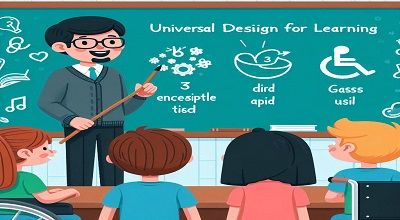3 principles of UDL
Universal Design for Learning (UDL) is an educational framework that aims to make learning accessible to all students by providing multiple means of representation, engagement, and expression. The 3 principles of UDL are:
Multiple Means of Representation:
This principle focuses on presenting information and content in various ways to cater to the diverse needs of learners. It acknowledges that individuals have different learning styles, preferences, and abilities. To address this principle, educators should:
- Offer information in multiple formats (e.g., text, audio, video, graphics).
- Provide different ways to access and decode information (e.g., subtitles, text-to-speech, images).
- Offer diverse examples and analogies to clarify concepts.
- Use a variety of media and technologies to present content.
Multiple Means of Engagement:
UDL encourages educators to create a learning environment that motivates and engages all learners. To achieve this, educators should:
- Offer choices and options for how students can engage with the content.
- Provide opportunities for students to connect their personal interests and experiences to the learning material.
- Use varied instructional strategies and activities to accommodate different learning styles.
- Foster collaboration and communication among students to enhance their engagement.
- Adjust the level of challenge and support to meet individual learner needs.
Multiple Means of Expression:
The third principle of UDL focuses on allowing students to demonstrate their understanding and knowledge in various ways. To address this principle, educators should:
- Offer flexible assessment options that align with students’ strengths and preferences (e.g., written essays, oral presentations, multimedia projects).
- Provide clear and constructive feedback to help students improve their work.
- Allow for student self-assessment and reflection.
- Support the development of executive functioning skills, such as planning and organization, to help students express themselves effectively.
By applying these three principles, educators can create a more inclusive and adaptable learning environment that meets the diverse needs of all learners, including those with disabilities or different learning styles.
Summary principles of UDL
Universal Design for Learning (UDL) is an educational framework that promotes inclusive and effective teaching and learning by providing multiple means of:
- Representation: Presenting content in diverse ways (e.g., text, audio, video) to accommodate different learning styles and abilities.
- Engagement: Creating a motivating and engaging learning environment by offering choices, connecting to personal interests, and using varied instructional strategies.
- Expression: Allowing students to demonstrate understanding through multiple means (e.g., written, oral, multimedia) and providing constructive feedback for improvement.
These 3 principles of UDL aim to support the diverse needs of all learners. Making education more accessible and effective for everyone.
